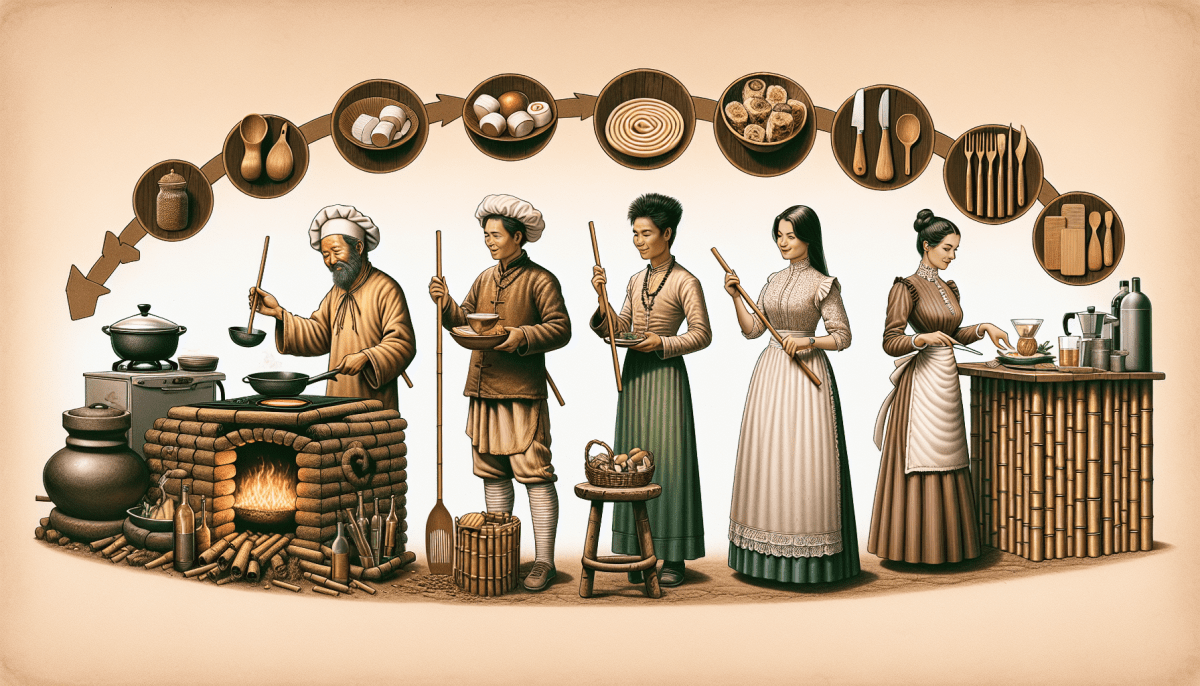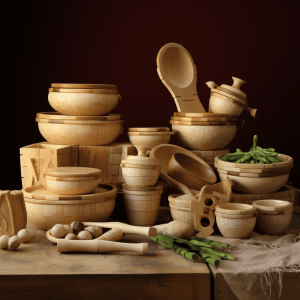Bamboo cookware has been an integral part of culinary traditions in many cultures for centuries. From its humble beginnings as a basic tool for cooking and serving food, bamboo cookware has evolved alongside advancements in technology and changing culinary practices, transforming kitchen experiences over time.
The use of bamboo cookware can be traced back to ancient civilizations, where simplicity reigned supreme. In these traditional kitchens, bamboo pots and baskets were commonly used for boiling, steaming, and storing food. Bamboo's natural properties, such as its ability to withstand heat and absorb excess moisture, made it an ideal choice for these purposes. Over time, as cooking techniques became more refined and efficient, bamboo cookware adapted to meet the evolving needs of chefs and home cooks alike.
Today, modern kitchens have embraced the versatility and eco-friendliness of bamboo cookware. With the rise of health-conscious cooking and sustainable living, bamboo has emerged as a top choice for both amateur and professional chefs. Its lightweight nature and non-reactive surface make it perfect for tossing salads, stirring sauces, and serving delicate dishes. Moreover, bamboo's inherent antibacterial properties make it a safe and hygienic option for food preparation.
As the world continues to explore innovative ways to reduce waste and promote sustainable practices, bamboo cookware is likely to play an even greater role. From eco-friendly cutting boards to stylish bamboo utensils, the possibilities for bamboo in the kitchen are endless. The evolution of bamboo cookware over time showcases the adaptability and timeless appeal of this versatile material, proving that traditional roots can still thrive in modern kitchens.
The Eco-Friendly Revolution: Bamboo Cookware and Sustainable Cooking
As the world embraces a more eco-conscious mindset, sustainable alternatives are increasingly sought after in various aspects of our lives. In recent years, bamboo cookware has emerged as a popular choice for environmentally conscious cooking enthusiasts. With its numerous benefits and innovative design, bamboo cookware is transforming culinary experiences and revolutionizing the way we cook.
One of the key advantages of bamboo cookware is its sustainability. Bamboo is a highly renewable resource that grows rapidly and doesn't require replanting. Unlike traditional cookware materials like metal or plastic, bamboo cookware is biodegradable and doesn't contribute to harmful waste or pollution. By opting for bamboo, we can make a positive impact on the environment while enjoying the art of cooking.
In addition to its eco-friendliness, bamboo cookware offers exceptional cooking performance. The natural properties of bamboo, such as its strength and natural oils, make it ideal for cooking. It distributes heat evenly, ensuring that your food is cooked to perfection. Furthermore, bamboo is resistant to stains, odors, and bacterial growth, making it a safe and hygienic option for your kitchen.
Unleashing Culinary Creativity: Exploring the Versatility of Bamboo Cookware
Bamboo cookware has been an integral part of culinary traditions for centuries, originating from various parts of Asia. Its versatility in the kitchen continues to impress chefs and home cooks alike, offering an array of benefits that transform culinary experiences over time.
One of bamboo cookware's most remarkable characteristics is its ability to provide even heat distribution. Whether it's a bamboo steamer or a bamboo cutting board, this material ensures that food is cooked evenly and thoroughly. This level of consistency is essential in cooking delicate dishes such as dumplings or sushi rice, as it allows for precise control over the cooking process.
Furthermore, bamboo cookware is renowned for its natural antibacterial properties. Unlike plastic or metal alternatives, bamboo contains an antimicrobial agent called bamboo kun, which helps prevent the growth of bacteria on the surface. This makes bamboo utensils and cutting boards not only a safer choice but also easier to clean and maintain.
Rediscovering Ancient Wisdom: Harnessing the Benefits of Bamboo Cookware
The use of bamboo cookware in culinary practices has a long and rich history, dating back thousands of years. Across various cultures and regions, bamboo has been embraced for its unique qualities that enhance the cooking experience. Today, as we strive to adopt sustainable and eco-friendly alternatives, bamboo cookware is making a comeback, offering a range of benefits for modern kitchens.
One of the significant advantages of bamboo cookware is its natural resilience and durability. Bamboo is known for its robustness, making it an ideal material for various kitchen utensils, including cutting boards, spoons, and steamers. Not only is bamboo highly versatile, but it also has the ability to withstand high temperatures without warping or cracking, ensuring the longevity of your cookware.
In addition, bamboo cookware is highly sustainable and environmentally-friendly. Bamboo is one of the fastest-growing plants in the world, requiring minimal water and no pesticides for cultivation. Its rapid growth rate means that it can be harvested and re-grown in a short span of time, making it a renewable and easily replenishable resource. By choosing bamboo cookware, you contribute to the preservation of natural resources and reduce your carbon footprint.
Furthermore, bamboo cookware possesses natural antibacterial properties. The composition of bamboo contains an organic compound called bamboo kun, which helps to prevent the growth of bacteria and microbes. This makes bamboo utensils and cookware a hygienic and safe choice for food preparation. Additionally, bamboo is non-porous and does not retain odors or flavors, ensuring that your food retains its true taste and freshness.
Bamboo Cookware
Sustainable and Stylish Cookware to Elevate Your Kitchen Experience
Product information
Product Review Score
4.38 out of 5 stars
126 reviews


